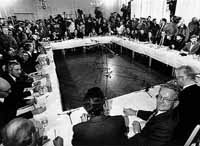The central Round Table meets for the first time in the Dietrich Bonhoeffer building in Berlin. Fourteen parties, political groups and organizations take part, all with different expectations. Following a heated debate, they agree to the following statement of function: »The participants in the Round Table are meeting out of deep concern about our country, which finds itself in crisis, and its independence and long-term development. They require the release of information on the ecological, economic and financial situation in our country. Although the Round Table cannot exercise parliamentary or government functions, it will offer the public proposals on how to overcome the crisis. It demands that it be informed promptly by the People's Chamber and the executive of important legal, economic and financial decisions, and that it be included. It sees itself as an element of public oversight in our country. It plans to continue its work until free, democratic and secret elections are held.« After the first day of discussion, the participants have already agreed on a concrete result: The first free parliamentary elections in East Germany will be held on May 6, 1990. It seems urgent that the various political groupings reach some accommodation, for the situation in the country is worsening.
As government spokesman Meyer announces, increasing dissatisfaction with attempts to suppress evidence of wrongdoing, and the slow pace of investigations to expose abuse of office and corruption, have been leading to spontaneous action that »hinders the work of government organs and is thus not in the citizens' best interest.«
Wolfgang Schwanitz, head of the Office of National Security, is forced to admit that four district offices have had to cease operations, while the work of others has been greatly restricted.
In Berlin, as a result of heavy public pressure, the headquarters of the former Ministry of State Security on Normannenstrasse must be opened up briefly for viewing by a supervisory group to prevent destruction of files. However, »there is not yet any talk of« declaring a state of emergency.
A spokesperson for the Prosecutor General's office announces the release of 15,000 people in a partial amnesty. Those not falling under he amnesty include people suspected of corruption, abuse of office, and enrichment, or those against whom investigations have been initiated in this connection.
The public is appalled by the news that the Berlin cemetery of the »Adass Yisroel« Jewish community has been desecrated again.
Demonstrations are held today in Berlin, as they are on the seventh of every month; on Alexanderplatz, there is the usual whistling for the elections of May 7. This time, the roughly 2,000 protesters march through the city center and then aim a chorus of whistles at the City Council building, announcing their demand for free and unrigged elections. At the Central Committee building, they call for a revision of the results of the spring elections. They chant, »We don't need Krenz or Kohl - only governing ourselves will make us feel whole!«
Demonstrations also take place in 20 other towns. The largest are in Erfurt and Rostock, with 15,000 participants each, and they loudly support the Round Table's demand for complete elimination of the Stasi.
© 1999, Christoph Links Verlag, Berlin

